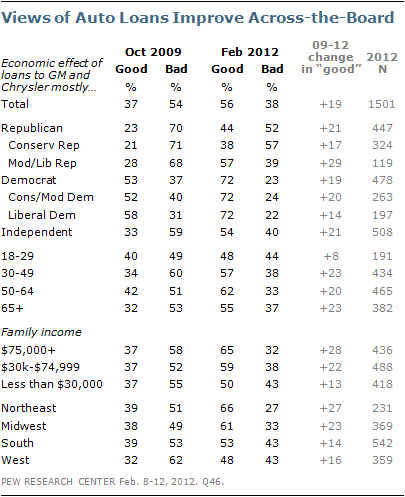
A majority of Americans (56%) now say the government loans made to GM and Chrysler in the midst of the financial crisis were mostly good for the economy, while 38% say they were mostly bad. In October 2009, almost a year after the loans were announced, public opinion was reversed: Just 37% said the loans were good, while 54% said they were bad.
Views of the auto bailout have grown more positive among nearly all groups. Today, Republicans are divided over the auto loans (44% mostly good for the economy, 52% mostly bad). In 2009, 70% of Republicans thought they had a negative effect on the economy while just 23% said they were mostly good for the economy.
Independents also had negative perceptions of the auto loans in 2009 (33% mostly good, 59% mostly bad), but opinions are now more positive than negative (54% vs. 40%). And while about half of Democrats (53%) said the loans were good for the economy in 2009, that number has risen to 72% today.
Opinion about the loans to General Motors and Chrysler is particularly positive in the Northeast and Midwest. About two-thirds of Northeasterners (66%) and 61% of Midwesterners say they have been good for the economy, compared with 53% of Southerners and 48% of Westerners. While those with annual family incomes of less than $30,000 are divided in their evaluations of the loans (50% mostly good, 43% mostly bad), those with higher incomes are more positive.
Among Republicans and Republican-leaning independent registered voters, there are no significant differences of opinions about the auto loans by income or education. Mirroring the pattern within the overall public, Republicans and Republican-leaning independent voters who live in the Northeast and Midwest are more positive in their views of the auto bailout than Republicans who live in the South and West; 52% of those in the Northeast and Midwest say the loans were mostly good for the economy, compared with 36% of those in the South and West.
Negative Views of TARP Persist
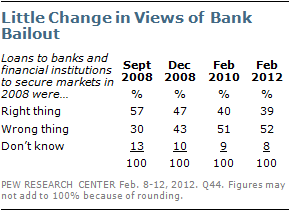
Public views of the major loans to banks and financial institutions made by the federal government in the fall of 2008 remain, on balance, negative. Today, 52% say these loans through the Troubled Asset Relief Program (TARP) were the wrong thing for the government to do, while 39% say they were the right thing. This is little changed from public opinion two years ago. Immediately following the decision to make the loans in mid-September 2008, a 57% majority said the government’s loans were the right thing to do.
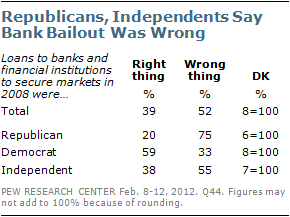
Partisans continue to differ in their views of these loans: Three-quarters of Republicans (75%) say the loans were the wrong thing for the government to do, as do a smaller majority of independents (55%). By contrast, about six-in-ten Democrats (59%) say the 2008 bank bailout was the right thing to do.
Among Republicans, conservatives are particularly likely to say the bailout was the wrong thing: Eight-in-ten (80%) say this, compared to 63% of moderate and liberal Republicans. There are no significant differences between liberal Democrats (61% right thing, 30% wrong thing) and their moderate and conservative counterparts (59% right thing, 35% wrong thing).
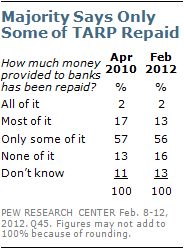
Public perceptions of how much of the TARP money has been paid back to the government have not changed much since April 2010: A majority (56%) say only some of the money has been repaid, while 16% say none has. Just 13% say most of the money has been paid back and only 2% say all of it. There are no significant partisan differences in perceptions of the repayments. College graduates are more likely than those without a college degree to say the loans have been mostly repaid (24% vs. 7%).
Opinions about Stimulus Less Negative than in 2010
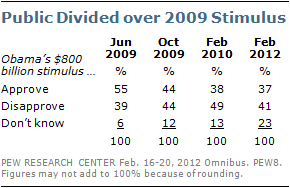
Three years after the passage of the economic stimulus package, public reaction is split: 37% approve of the $800 billion economic stimulus plan passed by Obama and Congress, while about the same percentage (41%) disapproves. While the percentage approving of the stimulus package is little changed from two years ago, disapproval has declined (41% disapprove today, compared with 49% in February
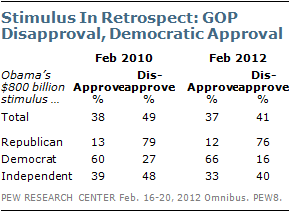
2010). In June 2009, a few months after the stimulus was passed, a 55% majority approved of the legislation.
Republicans continue to disapprove of the stimulus by an overwhelming margin (76% disapprove, 12% approve). Two-thirds of Democrats approve of the stimulus while just 16% disapprove. Independents are divided (33% approve, 40% disapprove).
Stimulus’ State Aid, Infrastructure Funding Viewed Positively
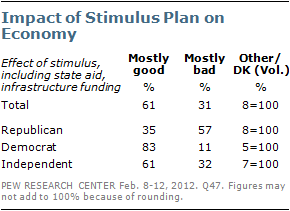
While overall opinions about the stimulus are divided, a majority of Americans (61%) say the stimulus plan, which included money for states to deal with budget problems and funding for roads and other infrastructure, was mostly good for the economy. Just 31% say the stimulus was mostly bad for the economy.
More than eight-in-ten Democrats (83%) say this stimulus was mostly good; just 11% say it was mostly bad. Independent opinions mirror overall public views: 61% say it has been mostly good for the economy; 32% say it has been mostly bad.
A majority of Republicans (57%) say the stimulus was mostly bad, including 62% of conservative Republicans. Moderate and liberal Republicans are more divided in their opinions: 47% say this stimulus was mostly good, while 45% say it was mostly bad. There are no significant ideological differences among Democrats.
Views about the Keystone XL Pipeline
There has been recent controversy over the building of the Keystone XL pipeline that would transport oil from Canada’s oil sands to refineries along the Gulf Coast, but the public is not following this issue very closely. Just 24% say they have heard a lot about it while another 39% have heard a little; 37% have heard nothing at all about the pipeline.
Among those who have heard at least a little, there is strong public support for building the pipeline. About two-thirds (66%) think the government should approve the building of the pipeline, while 23% say it should not be approved.
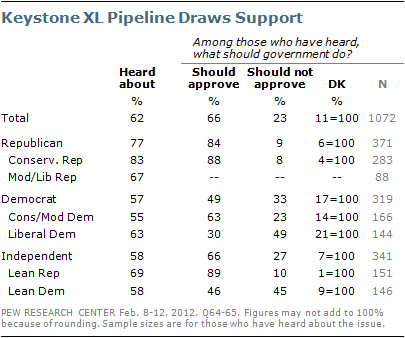
Republicans overwhelmingly support the building of the pipeline. Fully 84% say the government should approve the Keystone XL pipeline, including 88% of conservative Republicans.
Even among Democrats who have heard about the issue, a 49% plurality support the government approving the pipeline while 33% say it should not be approved. But there is a strong ideological division among Democrats; 63% of conservative and moderate Democrats support the building of the pipeline, compared with just 30% of liberal Democrats. A plurality of liberal Democrats (49%) say the pipeline should not be approved.
By a 66% to 27% margin, far more independents who have heard about the issue think the government should approve the building of the Keystone XL pipeline than say it should not be approved. Independents who lean to the Republican Party overwhelmingly support the building of the pipeline (89% say it should be approved). But Democratic-leaning independents are far more divided; 46% say it should be approved, while 45% say it should not be approved.




